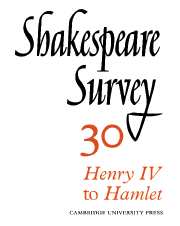Book contents
- Frontmatter
- ‘Henry IV’ and ‘Hamlet’
- Prince Hal and Tragic Style
- The True Prince and the False Thief: Prince Hal and the Shift of Identity
- Falstaff, the Prince, and the Pattern of ‘2 Henry IV’
- Whatever Happened to Prince Hal?: An Essay on ‘Henry V’
- ‘Henry V’ and the Bees’ Commonwealth
- ‘All’s Well that Ends Well’
- ‘Hamlet’ and the Power of Words
- Hamlet the Bonesetter
- ‘Hamlet’: A Time to Die
- Shakespeare, Lyly and Ovid: The Influence of ‘Gallathea’ on ‘A Midsummer Night’s Dream’
- Making a Scene: Language and Gesture in ‘Coriolanus’
- Freedom and Loss in ‘The Tempest’
- Inigo Jones at The Cockpit
- Theory and Practice: Stratford 1976
- The Year's Contributions to Shakespearian Study 1 Critical Studies
- 2 Shakespeare’s Life, Times, and Stage
- 3 Textual Studies
- Index
- Plate Section
‘Hamlet’: A Time to Die
Published online by Cambridge University Press: 28 March 2007
- Frontmatter
- ‘Henry IV’ and ‘Hamlet’
- Prince Hal and Tragic Style
- The True Prince and the False Thief: Prince Hal and the Shift of Identity
- Falstaff, the Prince, and the Pattern of ‘2 Henry IV’
- Whatever Happened to Prince Hal?: An Essay on ‘Henry V’
- ‘Henry V’ and the Bees’ Commonwealth
- ‘All’s Well that Ends Well’
- ‘Hamlet’ and the Power of Words
- Hamlet the Bonesetter
- ‘Hamlet’: A Time to Die
- Shakespeare, Lyly and Ovid: The Influence of ‘Gallathea’ on ‘A Midsummer Night’s Dream’
- Making a Scene: Language and Gesture in ‘Coriolanus’
- Freedom and Loss in ‘The Tempest’
- Inigo Jones at The Cockpit
- Theory and Practice: Stratford 1976
- The Year's Contributions to Shakespearian Study 1 Critical Studies
- 2 Shakespeare’s Life, Times, and Stage
- 3 Textual Studies
- Index
- Plate Section
Summary
‘Why does Hamlet delay?’ The question has been asked for over two hundred years now. And whether or not it is the best way to interrogate the play, it seems now a natural one. For after every new reading or performance, it’s difficult to avoid that prickling, sympathetic and exasperated sensation which formulates itself as: ‘Why does Hamlet delay?’ Whatever more correct form the enquiry takes, something to do with time does seem to be at the centre of Hamlet: which – to the extent that the play tells this kind of truth at all – makes the whole of life a great waiting game. The prince himself, who doesn’t know everything, and whose knowledge is above all that he doesn’t know everything, chooses to call what is happening to him, delay; and chooses to find himself guilty of it; or finds himself guilty, whether or not he chooses; and in all these ways, may be right. The qualifications are made necessary by everything in Hamlet that makes the simple and direct ‘Why does Hamlet delay?’ not the best of questions, though a natural one. All questions are leading, and condition the object of enquiry in the direction of what we want to know about it. To ask this particular one is to push Hamlet towards presuppositions about life and literature which are in themselves doubtful, and which almost certainly didn’t come into being until the period at which the question about Hamlet began to be asked about: the middle of the eighteenth century.
- Type
- Chapter
- Information
- Shakespeare Survey , pp. 117 - 124Publisher: Cambridge University PressPrint publication year: 1977
- 1
- Cited by

